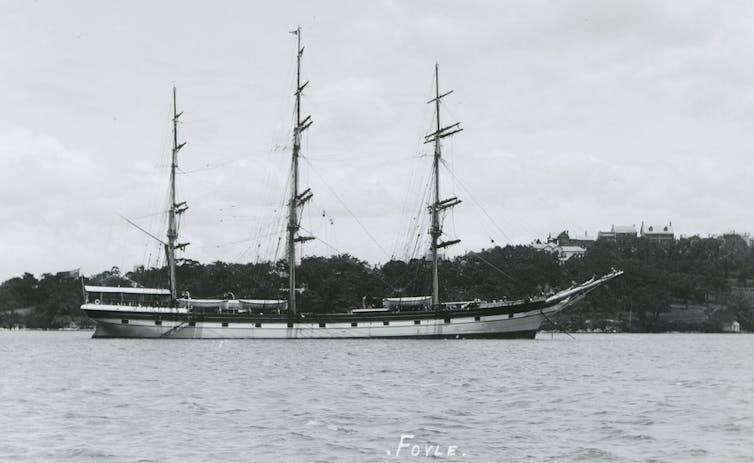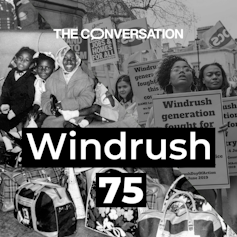



By María del Pilar Kaladeen, School of Advanced Study, University of London
My father never spoke to us about Guyana, the country of his birth, when we were growing up because he believed that his history had no value to his children. In doing this, he was unconsciously copying his grandparents, as well as others in his community, who had collectively chosen not to talk about their past.
Sadly, in our case, this familial silence was like a bullet that ricocheted down the generations. It was fired in 1886 when my 22-year-old great-grandfather was recruited from India as an indentured labourer to travel to British Guiana (the spelling changed to Guyana in 1966 after independence) on a ship called the Foyle. It went on to the vessel that carried my father to Britain from Guyana in 1961, before taking aim at my brothers and I – a group of disaffected and confused children who had no real understanding of what our cultural heritage was.
When my father, Surujpaul Kaladeen, left Guyana, aged 23, he joined half a million other people from the Caribbean who made the journey to a new life in the UK between 1948 and 1971. This group of people became known as the Windrush generation.
When people think about the Windrush generation the images they tend to associate with this period are the black and white photos taken of African-Caribbean people at Tilbury Docks or Waterloo train station.
They are unlikely to imagine someone like my father, who was not black but a person of Indian-Caribbean heritage. It took me many years to unpick my family history and to understand that we were not the only ones to experience this kind of cultural amnesia growing up.
When my son was born in 2013, I began to understand myself in the context of being an “invisible passenger in two imperial migrations”. Because, not only was the system of indenture generally unknown to the wider public, but as a consequence, the presence of Indian people in the Caribbean was also unknown. So, we were never recognised as part of the Windrush generation.
The fact that we did not look like we were part of a discernible community and that we were constantly faced with questions about our origins, was difficult for us growing up. I believe it was a contributory factor to the tragic outcomes that followed for my brothers.
The system of indenture was started in Mauritius in 1834 so that the British could cheaply replace enslaved Africans following the abolition of slavery in the British empire.
Under the British empire over two million people of Indian heritage were transported, through the indenture system, to countries on five different continents. While you will encounter British people of Indian-Mauritian, Indian-South African and Indian-Fijian heritage in the UK, the system of indenture that brought their ancestors to those countries is entirely absent from school curriculums and until recently, university syllabuses too.

The Insights team generates long-form journalism derived from interdisciplinary research. The team is working with academics from different backgrounds who have been engaged in projects aimed at tackling societal and scientific challenges.
But what has also helped Britain “forget” the creation and maintenance of the system of indenture across the 19th and early 20th centuries is the community’s own attitude to its past. Many of my great-grandparent’s generation connected their poverty and their departure from India – with its associated rupture of family ties – to feelings of shame.

State Library of South Australia, CC BY-SA
In the early 2000s I embarked on archival research for my MA and subsequent PhD on colonial writing on indentured Indians in Guyana, which sits between Venezuela and Suriname, and is the only English-speaking country in South America. Guyana is part of the mainland Caribbean region.
I was convinced that in understanding the series of events that had led my ancestors from India to the Caribbean in the 19th century, I would in turn be able to work out what had happened to my brothers: gifted, bright, and beautiful boys who had stumbled catastrophically into adulthood.
Whether expressed through prison sentences, addiction or homelessness, their existence seemed to be a rejection of anything that resembled a normal life.
We were of Caribbean heritage, but not black. We were further of mixed heritage as our mum was white, but nobody used these labels in those days and to the world outside we were simply “pakis” – the word British racists used as a pejorative slur for anyone of South Asian heritage.
What I did not understand then, and what I have come to understand only recently, is that any comprehension of the role that indenture played in our lives was incomplete without understanding my father’s journey from the Caribbean to the UK as part of the Windrush generation.
Considering the enormity of the system of indenture, which transported over two million men, women and children from India to parts of the British empire across the globe, it is surprising that it is so rarely acknowledged in public institutions in the UK. Indeed, the silence that surrounds it perhaps indicates how troubling its presence is in British imperial history as it disrupts the idea of the British empire as an institution that did not profit from exploitative systems of unfree labour after the abolition of slavery.
When indenture was abolished, it left an overseas Indian community scattered across the world.

A few facts unite the stories of those Indian communities: most never returned to India, despite their right to a free passage on completion of their indenture and a period of residence in the colony; and they spoke rarely or selectively about the past and what had led them to agree to travel so far.
Undoubtedly, many Indian indentured immigrants were duped into making the journey. It was common, for example, for recruiters to lie about the type of work and the amount of pay involved. But we also know that others made decisions to indenture based on an understanding that it could offer an escape from familial or societal pressures, famine and poverty.
In Guyana and Trinidad, the system itself sought to encourage Indian workers to remain in the country by offering a bounty or a plot of land to those that re-indentured. When considering the power of the plantation economy in individual countries and its ability to encircle workers, it is perhaps unsurprising that people made the decision to stay in their new homes, particularly in cases where they had left challenging family circumstances.
The population of the Caribbean was transformed by the system of indenture and not only from Indian labourers. Chinese indentured labourers arrived in Guyana and Trinidad in 1853 and to Jamaica in 1854. By the time the indenture system had been abolished in 1917, close to 18,000 Chinese and almost 450,000 Indians had been brought to the British Caribbean.
Whispering, so that no one will hear him and be offended, he speaks to the camera in his beautiful Berbice-to-Tooting-to-Cambridge drawl: “I believe that people don’t want to remember the past,” he says.
There is a photo of David standing outside our family home around 1974, he is just about smiling I think, and squinting because the sun is in his eyes. To me, he appears to be looking out at an unknown future that perhaps, because of this new house, seems a little brighter than before.
When David died in his early forties in 2008, having lived much of his adult life as a rough sleeper, my father was haunted by the decisions that he had made when we were children, believing that if he had just acted at a particular moment, David’s life could have been completely different.
He focused particularly on an occasion when David was racially attacked at school and another boy had hit him with a cricket bat. The incident had been serious enough to cause his head to bleed badly and my dad lamented that he had not immediately removed him from this school, which was famous in our area for being somewhere you survived rather than attended. Each of us have stories about David like this.
For my mum it was the night that David was stopped by the police and subjected to a humiliating strip search in a police van, despite explaining to the police that his house was 100 metres away and that if they knocked on the door, my mother would happily explain that the bike he was wheeling was not stolen: it was his.
I was a little girl at this time, perhaps only nine or ten years old, but I remember that even my mum, who famously “didn’t get” why we had a problem with racism, was angry. Like a million white women before her she had crossed the colour bar with certain misconceptions intact – the justice and the fairness of the British police was one of them.
Nobody asked us initially to identify his body because in typical David fashion he had always slept with his birth certificate on his person, in a plastic wallet, safe from the elements. My youngest brother, Eddie, who was born in 1973, refused to believe that the body in the hospital mortuary was David’s. As my father and I stood at the edges of the room, Eddie broke free and ran to his brother, touching his face as he repeated his name in disbelief.
In my eyes, his life since adolescence had been a long flirtation with death and each of us had made dashes across London to various hospitals where he had been taken after overdoses or as a result of being sectioned. In my mind, when I enter our childhood house and wander around the rooms looking for pieces of our story, I inevitably find Eddie, who was the centre of my life growing up.
Two years older than me, Eddie was the person in my childhood who I admired most. He was a strong, athletic boy who could draw, programme computers, skateboard like a demon and write incredible stories. I looked up to him enormously and refused to consider any of the accumulating evidence that he was lying to me regularly, right up until the point that a local drug dealer arrived on our doorstep demanding to see him.
Perhaps there is no intimacy like that of a sibling relationship. There are parts of ourselves that are known exclusively to the people who watched us when we were in formation. I am aware that in losing David and Eddie, I have also lost parts of myself; memories that are irretrievable without them.
It is of course impossible to know if my brothers’ lives would have been different if they had a better sense of our father’s history and heritage. But the void we felt as children and the way in which this absence of familial history affected them, motivated my studies.
I understood that much of my father’s reluctance to speak about the past was connected not only to his parents’ and grandparents’ omissions, but also the ideas he had garnered throughout his childhood that his history did not have the same value as that of his colonisers.
The superiority of everything British was an idea that had been absorbed throughout his boyhood in Guyana which remained a colony until 1966. Every aspect of his education was connected to Britain, and he spoke to me often, after he had retired, about a textbook that he remembered with great affection called the Royal Reader. It was in this book that he had encountered one of his favourite poems by Tennyson called The Brook.
In an echo of the silence of our childhood, I discovered, after my mother’s death in 2019, that he had managed to hide an early diagnosis of dementia from both her and us for over four years. In the remaining time we had left, as his illness worsened, he would share a story with me about his daily journey to Peter’s Hall primary school, the school that served the children of the sugar estate of the same name. In this tale he would recall his first teacher and the walk home from school where he would pass his uncles who were working as canecutters on the sugar estate.
He spoke often of his South Indian grandfather, Swantimala, and I remembered a story that his older brother had told me many years before, about how my father had nearly died as a toddler, but that Swantimala had come to the house and asked his daughter, my grandmother, for permission to take care of him during his illness. He returned with him only once he had recovered.
To me this story represented everything that we had lacked growing up in London: the wonder of an extended family and the security of being born into a community of others like you.
I imagined this handsome, dark-skinned, grey-haired man striding off down the road with my dad in his arms and his daughter, looking on, safe in the knowledge that he could make everything right.
I hoped that if my father, who died earlier this year, lost other memories, some trace of this sensation he would have had as a toddler could remain. That he was the beloved grandson of a man who loved his daughter, and a daughter who in turn trusted her father. A child who was in that moment safe in the land of his birth – peaceful and unaware of all that he would one day leave behind.
In the same documentary that features David Dabydeen’s search for his great-grandfather’s indenture records in Guyana, the late Indian-Fijian historian Brij Lal speaks of the dedication of his entire adult life, to the study of indenture. He says he is “haunted” by the “ghosts of the past”. He adds: “It’s very emotional because I am not talking about a group of people in the abstract, I’m talking about people from whom I’m descended.”
I am unable to give these memories of Swantimala and the comforting roots they provide to my brothers. It is of course too late for that.
But in those moments where it has felt nothing can counter the pain of their loss, that this work does not matter, I am reminded that the research itself is an act of resistance and that in advocating for the history of the “ghosts of the past”, any sound I can make is better than silence.

María del Pilar Kaladeen, Associate Fellow, Institute of Commonwealth Studies, School of Advanced Study, University of London
This article is republished from The Conversation under a Creative Commons license. Read the original article.
Discover the latest Business News, Sensex, and Nifty updates. Obtain Personal Finance insights, tax queries, and expert opinions on Moneycontrol or download the Moneycontrol App to stay updated!
Find the best of Al News in one place, specially curated for you every weekend.
Stay on top of the latest tech trends and biggest startup news.